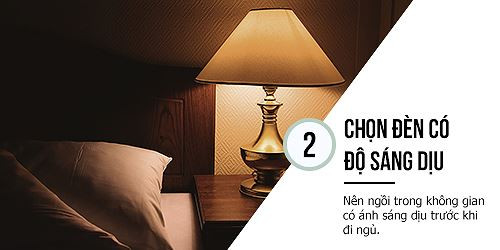7 good habits for sleep, slow down the aging process
Good sleep brings you many benefits such as strengthening immunity, improving brain activity or slowing down the aging process.
So if you have insomnia, try the following methods to help your body rest properly.
Tossing and turning, having trouble sleeping, or staying up all night is something no one wants after a long tiring day.
However, you can improve this condition with just a few simple ways. Building and maintaining a few daily habits will help you fall asleep easier and sleep more deeply.
You can try one or more of the 7 different methods below to get rid of the nightmare of insomnia.
 |
At night, human body temperature usually drops lower. According to a study conducted in 1997 by the Cornell Medical Center of New York Hospital (USA), two hours before going to sleep, human body temperature begins to decrease, and will drop to its lowest level around 4-5 am.
So when you soak in hot water, your body temperature rises - and the subsequent drop in temperature helps your body relax.
According to Dr. Joyce Walsleben, lecturer at New York Medical University (USA), if your body temperature increases by 1-2 degrees after soaking, the temperature will decrease when you go to sleep, which is just right for you to have a deep sleep.
So, two hours before bedtime, you should soak in hot water for 20-30 minutes. If you cannot soak, you can replace it with a hot bath.
 |
Late at night is when your body releases melatonin, a hormone that can make you sleepy. However, melatonin can only be released in the right environment.
“Melatonin is a night hormone – it doesn’t come out when you’re in a lighted room,” says Dr. Walsleben. “9 to 10 p.m. is the optimal time for melatonin to work.”
Sitting in a dimly lit space before bed will “signal” your melatonin hormone, getting you ready for a good night’s sleep.
 |
To help your body recognize and get used to bedtime, you can create a few habits and stick to them every night.
According to the recommendation of Dr. Gary Zammit (Director of the Sleep Disorders Research Institute in New York, USA), you should develop a few habits before bedtime to help your brain transition to sleep.
“Putting your pajamas on the bed, brushing your teeth, or combing your hair—these are habits that can help you fall asleep more easily,” Dr. Gary Zammit gives examples.
 |
Limiting your coffee intake at night may help you sleep better, as the caffeine in coffee is a mild stimulant.
According to Professor Welsleben's recommendation, people with sleep problems should not consume foods or drinks containing caffeine after noon, because this substance is difficult to absorb and can make it difficult for them to sleep at night.
On the other hand, decaffeinated coffee drinkers should also take note: according to a 2007 US consumption report, decaffeinated coffee sold at some chain stores actually still contains the substance.
A major coffee chain was found to contain up to 32 milligrams of caffeine in every cup sold - the equivalent of 340g of cola.
Nicotine is also considered a stimulant. Some people think that smoking before going to bed relieves stress, but this is a completely wrong idea.
According to Dr. Walsleben, smoking, especially before bed, can increase your heart rate and keep your brain from falling into a restful state.
 |
You may think that scrolling through social media to catch up on your friends and family before bed will help you relax. However, in reality, this activity can make you feel restless and make it harder to fall asleep.
Bright screens (including televisions) can stimulate your nerves, so you should limit their use if you want to get a good night's sleep.
“Don’t watch TV or check your email before bed. Instead, let your brain wind down by doing something relaxing, like sitting on the sofa—or wherever you feel comfortable—and reading,” suggests Dr. Walsleben.
 |
If cold feet are keeping you up at night—especially in the winter—try keeping your feet warm by wearing soft socks to bed. According to Phyllis Lee, PhD, professor at Feiberg School of Medicine at Northwestern University in Chicago, wearing socks will improve circulation and blood flow in your feet, making it easier to fall asleep.
 |
Eating too much at night, or eating spicy snacks close to bedtime can overload your digestive system and force it to work continuously, even when you are resting.
Alcoholic substances such as wine may make you sleepy, but they will disrupt your sleep stages later. Alcohol also prevents you from falling into deep sleep, especially REM sleep - the stage that is most necessary for the body to fully rest.
Also, if you drink too much water (or any other beverage) before bed, you may have trouble with nocturia.
“Most people in middle age and older experience nocturia,” says William C. Dement, MD, professor of neurology at Stanford University. “However, reducing the amount of beverages consumed before bedtime may help to alleviate some of the problem.”




